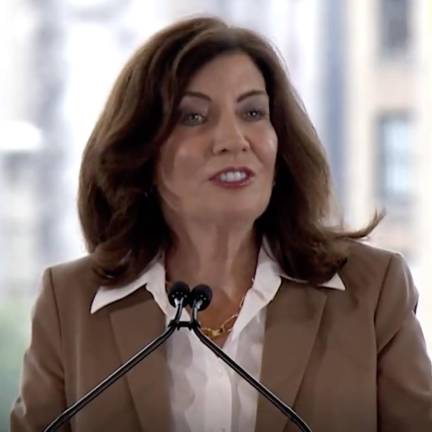Final Congestion Pricing Approval Sparks Joy For NY Politicians & Fury From Jerseyans
A congestion pricing toll for drivers south of 60th St.--meant to fund the MTA and combat carbon emissions and pollution--was federally cleared on June 26th. The proposal now goes to a six-member Traffic Mobility Board for implementation, which will set prices that could range as high as $23 during peak daytime drives. Gov. Kathy Hochul gave an exultant press conference on the pricing plan with the MTA commissioner Janno Lieber, a stark contrast with New Jersey residents and ride-share drivers that are infuriated by its green-lighting. NJ Gov. Phil Murphy argues it is really a double-toll on drivers in his state, because they already pay hefty bridge or tunnel tolls just to get into Manhattan.

Congestion pricing seems to be well and finalized, for real this time. The Federal Highway Administration’s official environmental review sign-off–following a public comment period that started in May–assures that the project can move forward. Also known as the Central Business District Tolling Program, the fundraising scheme would make drivers south of 60th St. in Manhattan pay a fee that is projected to be between $9 to $23 during the day, and from $5 to $12 at night. It is designed to raise $1 billion dollars for the beleaguered MTA (in addition to $14 billion already allocated), which the public transportation system will ostensibly use for travel and quality improvements. More crucially, it is supposed to reduce traffic by a minimum of 10 percent in the toll zone, thereby reducing air pollution and carbon emissions. Discounts or charging limitations will be included for certain lower-income residents or people whose livelihoods depend on driving (i.e. ride-share workers).
Gov. Kathy Hochul and a smattering of supportive politicians held a merry press conference at New York University after the final go-ahead was announced. In a shot at those lined up against the program, she said that “these vehicles have an alternative–an incredible alternative–called public transportation.” She listed the proposed knock-on benefits of the pricing plan: “How about less air pollution, lower carbon emissions, lower speeds, fewer crashes? I don’t mind losing that.”
The public figures flanking Hochul included Rep. Ritchie Torres of the Bronx, state senator Brad Hoylman-Sigal, and New York City Transportation Commissioner Ydanis Rodriguez and MTA Commissioner Janno Lieber, of course, who had a pep in his step as he took his turn at the mic and asserted that “congestion pricing means less traffic, better transit, cleaner air and safer streets.”
Mayor Eric Adams was notably MIA, perhaps in an admission of his ambivalence about the project in the run-up to this week. However, he ultimately gave a statement supporting the plan: “Congestion pricing has been given the green light, and we’re ready to get it done right. This is about more than just reducing traffic; this will lead to more resources for public transit, cleaner air, and safer streets.” He also claimed that “getting congestion pricing right also means ensuring that historically disadvantaged communities are not further burdened, and we are pleased to see that the environmental assessment now includes $155 million in investments to reduce truck pollution, improve asthma care, and expand parks.”
Manhattan Borough President Mark Levine also provided a statement welcoming the plan, where he pointed out that “Manhattan has some of the lowest rates of car ownership in the country, but some of the worst traffic. Congestion pricing will help reduce the number of vehicles on city streets, while also providing the public transit system with funding it desperately needs.”
Of course, not everybody is starry-eyed about congestion pricing, with natural oppositional constituencies forming in two groups that depend on their cars in NYC: New Jersey commuters and ride-share drivers. In fact, Jerseyans have enlisted their representatives to basically commence an interstate legal battle over the congestion plan, with U.S. Senator Josh Gottheimer bulldogging on CBS New York by saying that “this is just a cash grab for the MTA. They are desperate for dollars, so they look into hard-working commuters here from Jersey to be their piggy bank to [pay them for their] mismanagement.” NJ Gov. Phil Murphy now has two attorneys on retainer to determine a plan of attack against the tolling plan. Both politicians are Democrats, setting up an unusual intraparty war.
Ride-share and taxi drivers are also considerably irked by the project and the financial burdens they say it will initiate. The New York Taxi Workers Alliance, a prominent advocacy group, summed up their attitude when it came to the plan and the attendant press conference on Twitter: “While @GovKathyHochul is inside talking congestion pricing, we’re outside, on the streets we keep moving 24/7. @GovKathyHochul no more on our backs! Full exemption for yellow cabs!”
The next steps for the congestion pricing plan will be moving from estimated toll costs to official toll costs, a process that will be overseen by a six-member Traffic Mobility Review Board. This will be followed by yet another public comment period. According to Crain’s, the MTA’s estimated cost of infrastructure construction (to be modeled on already-existing EZPass technology) will come in at just under $110 million dollars. TransCore, a contractor based in Tennessee, will have 310 days to finish the project.